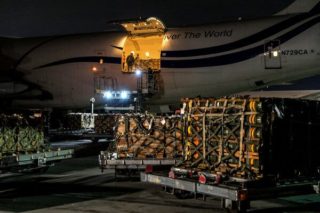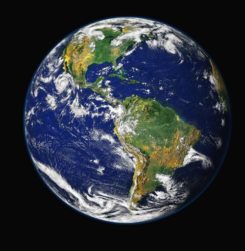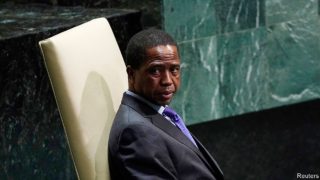
ON THE MORNING of February 26th Volodymyr Zelensky posted a video of himself on Twitter. After a night of the worst fighting Kyiv had seen since the second world war, and of propaganda from Moscow claiming that he had fled the capital in fear, Ukraine’s president emerged from his office red-eyed and unshaven. He was holding a smartphone in his right hand as he filmed himself walking past the House with Chimaeras, a famous Kyiv landmark that serves as the presidential residence. He smiled at the camera and declared: “Good morning to all Ukrainians! There are a lot of fakes out there…[but] I am here.”
Mr Zelensky looked exhausted, but happy: happy to be alive, happy that Kyiv had not fallen and happy to play the role of a national leader, holding his nerve and his country together in the darkest hour of its 30-year history as an independent state. That was not the role he had chosen, but the one that was thrust upon him when Russia invaded Ukraine on February 24th. He has carried it off with dignity, strength and a dash of humour. When America offered to airlift him to safety, he retorted: “The fight is here; I need anti-tank ammo, not a ride.”
The night before, speaking in Moscow, Vladimir Putin, Russia’s president, had pledged to rub out Mr Zelensky. Ukraine’s president is a native Russian-speaker of Jewish heritage. Nonetheless, seething with hatred, Mr Putin called him and his government “drug-taking Nazis”.
The contrast between those two pronouncements could hardly be more striking. If, as Mr Putin once wrote, Ukraine is the anti-Russia, then Mr Zelensky is everything Mr Putin is not. He is young and charismatic. He has been embraced by his own people and by the world. And he is fighting for his country not in the name of a dark imperial fantasy, but out of the conviction that Ukraine is sovereign and independent.
Mr Zelensky was born in 1978 in Kryvyi Rih, a Soviet-looking, industrial city in the south-east of Ukraine, a centre of iron mining and metallurgy. His favourite film was “Once Upon a Time in America”. To survive among the town’s knife-wielding gangs, you had to have a sense of humour, chutzpah and a posse that had your back. Mr Zelensky had all of these things, in abundance.
He burst onto the political scene in 2019. He was not a candidate of Ukrainian-speaking western Ukraine nor of the Russian-speaking east. Instead, he rejected the linguistic, historical and ethnic split that has long been exploited both by Ukrainian politicians and by the Kremlin. Partly as a result, he has brought the country closer together than it has been for years. Mr Zelensky was driven neither by nationalism nor ideology. Nor was he a revolutionary. He was Everyman.
In a country where politics was an extension of business and where parliament was a forum in which different elites traded with each other, Mr Zelensky had one asset that trumped money, parties and television channels. He had popularity and a stage persona that appealed to people who were tired of war, scheming and the cynicism of their elites. They fell in love not so much with him, but with his fairy-tale television character, Holoborodko, a plain-talking schoolteacher who had miraculously been transformed into the president.
Whereas his predecessor, Petro Poroshenko, an oligarch, donned military uniform and campaigned on the slogan of “Language, army, faith”, Mr Zelensky, recorded videos, with a clown’s red nose. “I challenged…our elites’ [politics]. They called me a clown. I am a clown, and I am very proud of it.” But his message was serious: they were fooling people. He was being honest.
Mr Zelensky entered the real presidency with few clear plans other than to make things better. He had only a vague idea of how to do so. Some of his former aides have said that he had not expected to win.
In the third year of his presidency and in the third day of the invasion, this actor-turned politician is fast becoming a hero. “Zelensky is fighting like a lion and the whole of Ukraine with him,” says Sevgil Musaeva, a Ukrainian journalist and the editor of Ukrainska Pravda, the country’s main online news site.
Yet only a few weeks earlier many Ukrainians and foreigners had been treating Mr Zelensky with condescension and pity. As Russian pressure mounted and Mr Putin threatened Ukraine with war, he had seemed out of his depth. His popularity was falling, investors and oligarchs were fleeing Ukraine and foreign leaders were nudging him to compromise with the Kremlin over the humiliating Minsk accords signed by his predecessor at the barrel of a gun in 2015. Many doubted that a former comedian was the right man for a country about to be invaded.
However, in the cauldron of the battle, Mr Zelensky has been saved by his gift as an actor. His ability to respond to the audience is precisely what has enabled him to embody the role of a real national leader in a time of war. He can mirror and project people’s fears, desires and dreams. Ukraine has come together after the invasion. He is as much inspired by the spirit of his people as he inspires them.
Likewise, the reason he could not accede to Russia’s demands over the Minsk accords was not because he was made of steel. It was because he was flexible and astute enough to know that his country would have swept him aside if he had.
Mr Zelensky is a representation of Ukraine, not as idealised myth but as reality. Like the country he leads, Mr Zelensky is far from perfect and he is often frustrating. Over the past few decades Ukraine has slowly been discovering what it is to be a democracy. Unlike Russia, it is a place where people elect their presidents and kick them out if they fail.
In his presidential victory speech in 2019, Mr Zelensky nodded to this reality, and the example it set: “To all the countries of the former Soviet Union: look at us, everything is possible.” Perhaps it was that line that made him Mr Putin’s most dangerous enemy.
In the same way, during the crisis today he has appealed to the Russian people who have protested against the fratricidal war that is being waged in their name: “Stop those who lie to you, who lie to us, who lie to the whole world.”
His response to Mr Putin’s rambling, hour-long national address on February 21st, which amounted to a declaration of war, was short and punchy: “We don’t have time for lengthy history lectures, I am not going to talk about the past. Let me tell you about the present and the future. The internationally recognised borders of Ukraine will stay as they are. We will remain calm and confident.” The outpouring of support from the world, people as well as politicians, and their disgust at Russia’s war are keeping spirits high.
Standing outside the House with Chimaeras on that bright morning, with the blue sky behind him, Mr Zelensky again sounded a defiant note: “We will be defending our country, because our weapon is truth, and our truth is that this is our land, our country, our children, and we will defend all of this.” If fortune favours Mr Zelensky, it is because he carries the virtue that Mr Putin lacks: he speaks the truth for his people.
By The Economist




